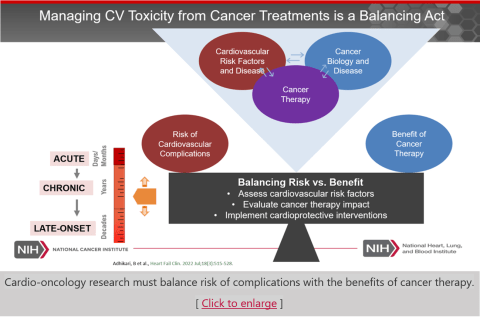Date Posted, by DCP Staff
Cardio-oncology research looks at cancer treatment-related cardiotoxicity, or damage to the heart and cardiovascular system (including heart valves and vessels) that can occur during or after cancer treatment. Over the last decade, efforts from the National Cancer Institute (NCI) in this area, as well as the field in general, have expanded significantly.
Importantly, NCI and the National Heart, Lung, and Blood Institute (NHLBI) together have developed several funding opportunity announcements (FOAs) that have led to increased collaborative research projects across a wide spectrum of basic, translational, and clinical research.

“The collaboration of cardiology with oncology has created research teams that utilize both areas of expertise. Together, they have done and are continuing to do significant work in this field, as evidenced by the many studies that are either completed or in progress,” said Eileen Dimond, R.N., M.S., a DCP nurse consultant and program officer who is part of the NCI-NHLBI cardio-oncology team and the original coordinator of the NCI Community Cardio-Oncology Task Force led by NCI Division of Cancer Prevention (DCP) Deputy Director Lori Minasian, M.D.
Recent publications on NCI-supported cardio-oncology research include:
- Study findings, published in Cancer Epidemiology, Biomarkers and Prevention, showed that while self-reported physical activity, functional capacity, and cardiac function all decline within the first 3 months of a person receiving breast cancer treatment, participation in physical activity during treatment may mitigate declines in cardiac health.
- Two studies have investigated the long-term outcomes of children treated with dexrazoxane when they were newly diagnosed with cancer, compared to childhood cancer survivors who did not receive the drug. Dexrazoxane decreases the cardiotoxicity of a class of drugs called anthracyclines by preventing the formation of free radicals through binding or removing the iron from the anthracycline-iron complex. The findings, from the Children’s Oncology Group (COG), were published in Cancer and the Journal of Clinical Oncology (JCO). The Cancer paper showed that treatment with dexrazoxane did not appear to adversely affect long-term mortality, event-free survival, or the risk of a second cancer. The JCO paper looked prospectively at a small cohort of 195 now adult cancer survivors diagnosed as young adults from the larger study and showed a cardioprotective effect from dexrazoxane up to 20 years after treatment.
- A design paper in BMC Cardiovascular Disorders outlined the rationale for a COG randomized, double-blind, placebo controlled study of 250 young adult cancer survivors investigating whether low doses of a long-used beta blocker called carvedilol can prevent left ventricle remodeling in childhood cancer survivors who received cardiotoxic anthracycline drugs. This study is under analysis, and the impending results will give insight into a possible risk-reduction strategy for high-risk childhood cancer survivors.
- An article in The Cancer Letter looked at the Southwest Oncology Group (SWOG) Cancer Research Network S1501 clinical trial, which is studying how well carvedilol works in preventing cardiotoxicity in people with HER-2-positive breast cancer that has spread to other parts of the body. The article points to the NCI Community Cardio-Oncology Task Force as one of the drivers for this trial being designed across cardiology and oncology “silos,” and for helping facilitate its ultimate trial approval and activation.
- A study funded by NCI and NHLBI looked at whether the statin atorvastatin (40mg) vs. placebo taken by people with breast cancer and lymphoma during treatment with doxorubicin, a chemotherapy drug, might slow the decline of left ventricular ejection fraction (LVEF). While the findings, published in NEJM Evidence, showed that in patients with no cardiovascular indications for statin therapy, prospective statin treatment had no effect on LVEF declines 2 years after doxorubicin treatment, this finding adds to the knowledge base on the use of cardiovascular medications during cancer treatment.
Results from a Decade of Collaboration

The major effort to expand the field began in 2013, when program officers from NCI and NHLBI convened a workshop where experts in cardiology and oncology across academia, industry, and government addressed the challenges of cardiotoxicity. This initial gathering not only identified knowledge gaps in this emerging field, but also determined research priorities. The workshop led to the development of NIH funding opportunities to support research in this space, as well as a task force to discuss and vet research study designs for potential implementation across the NCI research networks and beyond.
In 2016, then Vice President Joe Biden launched the Cancer Moonshot℠, which allowed further cardio-oncology research addressing the Moonshot priority area of minimizing cancer treatment’s debilitating side effects. Five years after the initial workshop, in 2018, about 100 researchers gathered at NIH, where NCI and NHLBI convened a follow-up conference aimed at discussing progress, exploring ongoing work, and redefining and updating research priorities. The growing field of cardio-oncology had made new strides, including a wide spectrum of research projects, and addressed some of the early gaps. The researchers also identified new priorities and needs, providing a clearer picture of where this area of research can go.
Growing the Field of Cardio-Oncology
After the 2018 workshop, the field of research on cancer treatment-related cardiotoxicity continued to grow. In 2019, the Journal of the American College of Cardiology (JACC) launched JACC: Cardio-Oncology, which, according to the journal, aims to “advance the cardiovascular care of cancer patients through the publication of rigorously executed, innovative science.”
A State-of-the-Art Review on the design of NIH-funded cardio-oncology studies was published in the JACC: Cardio-Oncology inaugural issue and included several co-authors conducting research in treatment-related cardiotoxicity as NCI and NHLBI principal investigators. The review focused on five large NIH-funded clinical trials on cardio-oncology that aimed to promote collaboration between cancer and cardiovascular scientific communities and was led by Dr. Minasian.
In 2022, the European Society of Cardiology issued European guidelines for health care professionals providing care to oncology patients before, during, and after cancer treatment with respect to their cardiovascular health and wellness. The guidelines encompass the definitions, diagnosis, treatment, and prevention of cancer therapy-related cardiovascular toxicity, as well as the management of cardiovascular disease caused directly or indirectly by cancer. Other important milestones include:
- In 2021, NCI and NHLBI issued a Notice of Special Interest (NOSI) on Improving Outcomes in Cancer Treatment-Related Cardiotoxicity that expires November 6, 2024.
- In July 2022, in the journal Heart Failure Clinics, the cardio-oncology team from NCI and NHLBI conducted a portfolio analysis and wrote about the decade-plus NIH-supported cardio-oncology research being conducted, and its importance.
- In September 2022, the NIH cardio-oncology team published a commentary in JACC: Cardio-Oncology on the impact of the Cancer Moonshot on the field.
- In December 2022, the team presented a webinar about their work called, “A Decade of NIH Cardio-Oncology Research Collaboration: Continued Funding Opportunities” (video available).
For more on the work NCI’s DCP is doing in this area, see the DCP cardiotoxicity page. DCP acknowledges the contributions of our cardio-oncology team colleagues in the NCI Division of Cancer Control and Population Sciences: Nonniekaye Shelburne, and from NHLBI: Bishow Adhikari, Patrice Desvigne-Nickens, and Scarlet Shi.
If you would like to reproduce some or all of this content, see Reuse of NCI Information for guidance about copyright and permissions. Please credit the National Cancer Institute as the source and link directly to the blog post using the original title, for example: "Collaboration Spurs Rapid Growth and Progress in Cardio-Oncology Research was originally published by the National Cancer Institute." For questions, contact us at CancerPreventionBlog@mail.nih.gov.
